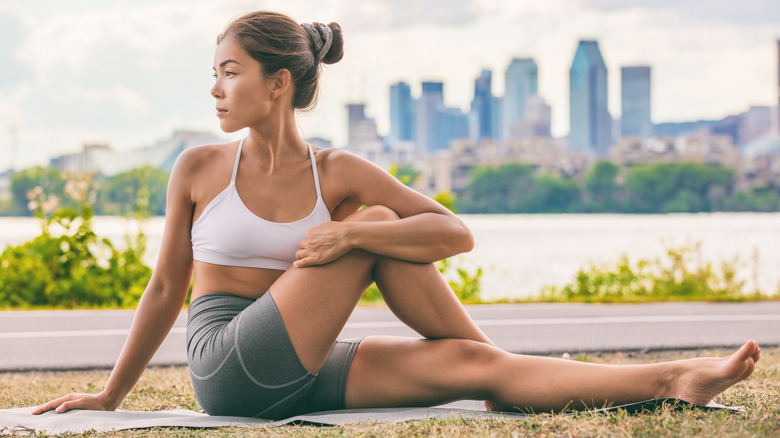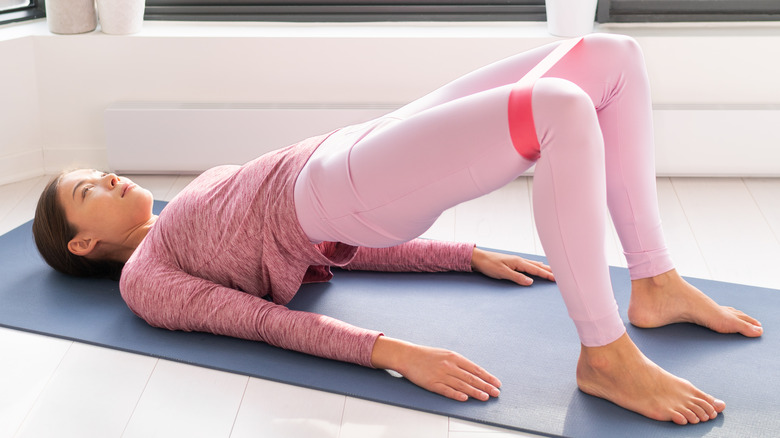These Three Bad Habits Are Wrecking Your Hips
Hip pain can be brutal. Because humans are bipedal, we rely on our hips for sitting, standing, walking, and generally moving around. If one or both hips are in pain, there can be significant disruptions to your day. According to WebMD, approximately half of older adults report that they experience hip pain. As we age, joint pain can become more prevalent, but even for people who are younger, there are many things that can trigger hip pain. Sometimes, you may not even be aware that your habits are contributing to hip pain.
Hips are responsible for supporting the body's weight and controlling the movement of the legs (via Brain Lab). The right and left hips consist of muscles, ligaments, bones, and joints. When any part of the hips becomes injured — even slightly — the pain can be immense. There are many medical and lifestyle treatments that can ease hip pain, often getting rid of the pain completely (per WebMD). One of the best ways to keep hip pain at bay is to take steps to correct bad habits that could lead to hip pain down the road. Learning how to refrain from positions that could damage your hips, engaging in appropriate gym workouts and exercises to strengthen hip muscles, and adhering to general advice for living as free from hip pain as possible can help you protect these important parts of your body.
Bad habits to avoid
Our hips are meant to move around into various positions, but some positions that are more harmful than others, according to Well+Good. While hips can occasionally brace for uneven weight loads, like leaning to one side, consistently placing too much weight on one hip can lead to pain and increased wear and tear. This is true for activities including walking, standing, sitting, and sleeping. If you're a side sleeper and favor one side, there's a decent chance that you'll eventually experience hip pain on that side. Even though side sleeping can protect the spine's alignment, curling up in a fetal position when you snooze can put excess pressure on your hips. Sleeping with a body pillow to take the weight off of your hips and improve spinal alignment is a good way to correct this habit.
In the technological age, it's difficult to avoid sitting at a desk. However, too much time spent sitting can lead to potential pain and muscle degeneration (via Well+Good). During days when you find yourself sitting for long blocks of time, try taking regular breaks to stretch your legs and get your joints moving. If you can't break away from your screen, stand at your desk for a few minutes every hour. The final bad habit you should say goodbye to is going too hard at the gym, lifting weights that are too heavy, and exercising with poor form. When it comes to proper form, never slack.
Protecting your hips
No matter your age, taking steps to protect your hips is vital. In addition to cutting out bad habits like sitting for extended periods of time, improper form at the gym, workouts that are too intense, and avoiding consistent weight imbalance, there are preventative habits you can adopt. Since the hips are responsible for supporting the body's weight, it's important to keep your weight within a healthy range, according to Northwell Health. One way to do this is to eat a nutritious diet that is balanced with protein, fiber, healthy fats, and lots of whole foods. Vitamin C is a nutrient that can help by increasing the collagen that lubricates joints and creates cushioning to prevent injuries. Foods with anti-inflammatory properties, like leafy greens and nuts, can also fight hip pain.
Incorporating stretches and low-impact exercises to strengthen your hips can both protect them and ease any current pain (per Healthline). Hip bridges are one of the best exercises for hip health, which can be performed by laying on your back and placing your feet flat on the ground, then slowly moving your hips up and down. For added strengthening of the hips, you can use a resistance band placed above your knees, but never push yourself too hard to avoid injury. Daily stretching is recommended for increasing flexibility in your hips. Always consult with your healthcare provider if you have concerns.



